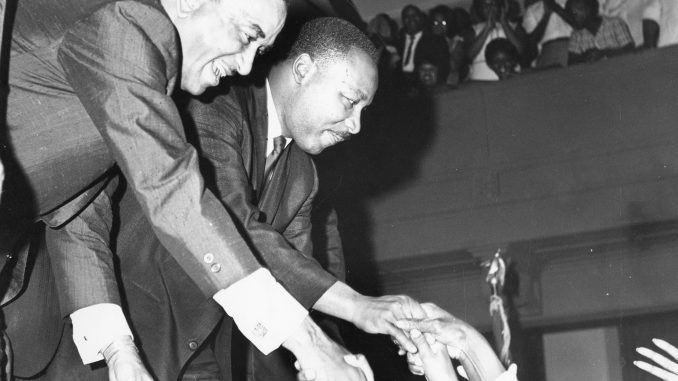
On a humid day in 1965, a lively crowd filled the historic Baptist Temple at Broad and Berks streets, the present-day Temple Performing Arts Center. Cameras rolled and the crowd was teeming with energy and anticipation for the night’s main event, an address from Rev. Martin Luther King Jr.
“To all of my friends and coworkers seated here on the rostrum, my brothers and sisters of the city of Philadelphia: I stand at this spot today with mixed emotions,” King said in the address, according to a transcript originally broadcasted on Aug. 5, 1965, on KYW-TV. “On the one hand, I’m thrilled to stand here. I’m enthralled to stand here, and notice you assembled in our presence by the thousands and the thousands … But on the other hand … I’ve seen too much hate!”
King’s stop in Philadelphia was part of a larger speaking tour through six cities in the Northeast and Midwest to discuss the living and working conditions of African Americans in Northern cities, according to the Philadelphia Bulletin.
“King comes to Philly on a trip to multiple cities to decide where he’s going to launch a civil rights campaign next,” said Keith Riley, a fourth-year history PhD candidate. “His plan was to organize a large civil rights push challenging racism in the North, along the lines of what he did in Birmingham in ‘63.”
King’s Philadelphia visit featured an extensive itinerary of rallies, meetings and one-on-one conversations with residents. In his address at the Baptist Temple, he discussed issues impacting the Black community in North Philadelphia, including segregation in housing and schooling, and employment discrimination, the Bulletin reported.
“The minute you segregate a man, you have the key in your hand that would open the door to discrimination,” King said in his address, according to the transcript, followed by loud applause.
While African Americans in Philadelphia did not face the same legislative segregation that existed in the Deep South, racism at this time was present in Northern cities, Riley said.
In the speech, King said housing segregation and job security are parts of the broader obstacle of economic insecurity which he said was “… the greatest problem that the Negro faces at this hour.”
As part of his 1965 visit to the city, King also spoke to large crowds at 40th Street and Lancaster Avenue in West Philadelphia, and outside Girard College on Girard Avenue, where protests for desegregation led by Philadelphia’s preeminent civil rights activist Cecil B. Moore had been ongoing for weeks.
“The protests really brought people together and it was really awesome to see that unity. There was no gang warring at that time,” said Bernyce Mills-DeVaughn, 80, who participated in the protests after moving to 20th Street and Girard Avenue in Philadelphia in 1964.
She recalled Moore and King representing different issues to the Black community in Philadelphia at the time.
“Cecil B. Moore was involved with Philadelphia’s NAACP, whereas King was involved with the Southern Christian Leadership Conference, so they were really cut from different cloth in that way,” she added.
Conditions of King’s visit in 1965 were tense due to his contentious relationship with Moore, who also spoke at the Baptist Temple on Aug. 4, 1965.
“Moore was very much weary of King because he saw him as a challenge to the power he had within the movement in Philadelphia,” Riley said.
King almost canceled his visit due to Moore’s concerns that he had been left out of much of the tour’s planning process, the Philadelphia Inquirer reported.
“Whenever things were said, we said it about some people that were against us,” Moore said between King’s speech, according to the transcript. “Because we also want you to say that you might be against us, and we hope that you won’t sabotage.”
King and Moore still appeared united throughout King’s two-day speaking tour in Philadelphia. Following King’s visit to the Baptist Temple, he would only return to Philadelphia twice before his assassination on April 4th, 1968.
“To the community, I go in with a unifying philosophy, and a unifying approach, and I certainly feel that in Philadelphia we have that unity now, and I think all of the forces will be working together,” King said, according to the transcript.


Be the first to comment